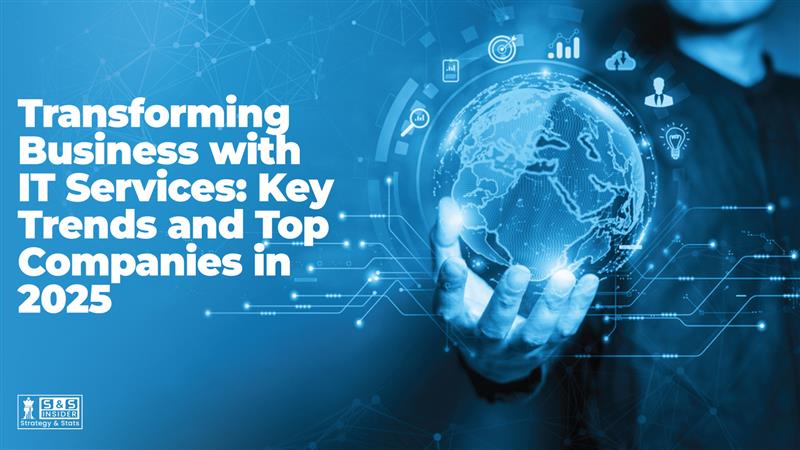
The global digital economy continues to be anchored by the information technology (IT) services sector, which is constantly changing how companies develop and conduct business. The IT services Market is expected to reach around USD 3 trillion by 2034, with a compound annual growth rate (CAGR) of roughly 7% from 2025. Accelerated digital transformation, cloud computing, artificial intelligence (AI), cybersecurity developments, and the emergence of hybrid IT systems are the main drivers of this extraordinary growth.
Key Trends Shaping the IT Services Industry in 2025:
AI and Automation Transforming Operations: By automating repetitive jobs, boosting predictive analytics, and facilitating better decision-making, artificial intelligence, especially generative AI, is completely changing IT operations. AI-powered automation increases operational efficiency and lowers expenses by up to 45% by eliminating manual labor.
Cloud Computing and Hybrid Infrastructure: Enterprises can attain agility and scalability through the implementation of cloud and hybrid models. Hybrid architecture ensures flexibility and cost-effectiveness by combining public and private clouds with on-premise data centers.
Cybersecurity as a Strategic Priority: In order to protect sensitive data and ensure business continuity, IT service providers are placing a greater emphasis on zero-trust architectures and AI-based real-time threat detection as cyber-attacks become more complex.
IoT and Edge Computing Integration: For sectors that depend on making decisions quickly, the combination of edge computing with the Internet of Things allows for faster, real-time data processing with lower latency. These capabilities are improved by the spread of 5G, which offers fast, low-latency communication.
Longer, More Strategic Contracting: Longer-term agreements covering full digital transformation projects, such as cloud migration, AI integration, cybersecurity improvement, and infrastructure modernization, are how businesses are enlisting IT service providers.
Focus on Productivity and Outcome-Based Models: Service providers are being evaluated more and more on their capacity to produce quantifiable business results, using analytics and artificial intelligence to show value and enhance operations.
Leading IT Services Companies and Their Strengths
Accenture
A global leader in consulting and outsourcing, Accenture specializes in AI, cloud strategy, enterprise digital transformation, and industry-specific innovation. Their focus on integrating cutting-edge technologies and strategic consulting empowers clients to rapidly adapt and innovate.
IBM Corporation
IBM blends expertise in AI, hybrid cloud, quantum computing, and blockchain technologies. Renowned for its AI-powered enterprise solutions, IBM drives innovation through its Watson AI platform and extensive cloud ecosystem, enabling secure, scalable IT operations.
Tata Consultancy Services (TCS)
TCS is a powerhouse in IT services across multiple sectors, excelling in digital transformation, cloud migration, and AI-enabled automation. Its expertise spans business process services, consulting, and IT infrastructure management, making it a trusted partner for global enterprises.
Infosys
Known for its innovation-driven approach, Infosys emphasizes automation, AI integration, and cloud computing. The company invests heavily in upskilling its workforce and sustainable IT practices, helping clients modernize their IT landscapes and achieve efficiency.
Wipro
Wipro focuses on AI-driven IT services, cybersecurity, and sustainable technology solutions. Its global delivery model supports digital transformation across sectors, accentuating customer-centric innovation and operational resilience.
HCL Technologies
HCL Tech excels in application modernization, IT infrastructure services, and cybersecurity. It integrates AI and automation tools to enhance service delivery, accelerate innovation, and optimize IT operations for global clients.
Capgemini
Capgemini shines in consulting and technology services, with strong capabilities in cloud engineering, AI, and IoT. Their co-innovation approach helps clients reimagine business models and accelerate digital transformation.
The Future Outlook of the IT Services Industry:
IT services' future is closely linked to both changing business requirements and technology breakthroughs. Intelligent automation that greatly increases productivity and operational agility will be made possible by AI and machine learning, which will continue to transform IT operations. In order to balance workload efficiency, data sovereignty, and security, hybrid and multi-cloud architectures are anticipated to become the standard as cloud usage continues to grow.
As threats increase, cybersecurity will adapt by utilizing advanced AI-powered detection and response systems. 5G-enabled IoT and edge computing will open up new real-time operating possibilities in sectors including logistics, healthcare, and manufacturing.
Additionally, outcome-based models, which prioritize quantifiable business value over transactional services, will become more prevalent in IT service engagements. Relationships between clients and providers will be redefined by longer contracts that incorporate various digital transformation efforts.
As businesses and providers invest in ethical AI practices and green IT solutions, sustainability and ethical technology deployments will become more popular. As new technologies like generative AI and quantum computing become essential, workforce change and ongoing reskilling will be crucial.
Conclusion:
The IT services sector will continue to be a vital global business partner, fostering innovation and resilience via superior technology. In a constantly changing digital landscape, firms like Accenture, IBM, TCS, Infosys, Wipro, HCL Tech, and Capgemini will continue to set the standard by incorporating cutting-edge technologies, encouraging innovation, and producing commercial value.